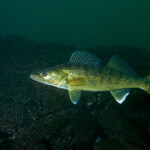Federal judge critiques FDA’s approval of genetically modified salmon

Massachusetts-based biotechnology company AquaBounty is prepared to harvest its first genetically engineered AquAdvantage salmon later this year, but the concept of a genetically engineered fish on dinner plates still faces opposition.
During a hearing last week, U.S. District Judge Vincent Chhabria expressed concern with the environmental assessment the Food and Drug Administration (FDA) used to approve genetically modified salmon from biotechnology company AquaBounty for production and sale.
Chhabria said he’s concerned that AquaBounty, the biotech company behind the GMO salmon, might use the FDA’s finding of “no significant impact” to expand the program without realizing its full impact on local ecology, according to Courthouse News.
AquaBounty’s engineered salmon is a genetic mix of ocean pout and Pacific Chinook designed to grow larger and faster than wild salmon.
In 2015, the FDA approved the company’s application to make and sell the genetically engineered salmon. The approval sparked a lawsuit from the Center for Food Safety and several environmental organizations and commercial fishing trade groups.
Chhabria said the FDA’s environmental assessment could set a precedent for approving future AquaBounty facilities.
“I’m not saying it opens the floodgates or sets the standards, but perhaps it pushes us in a direction and future agency action will likely be informed by this agency action,” he said. “Shouldn’t the FDA in this case have considered the fact that this was the first such facility and future decisions would be building on this facility?”
AquaBounty is preparing to launch a new farm, likely in the Midwest, and could potentially break ground in early 2021.
FDA officials countered Chhabria’s claim, stating that plans for future farms and products would be under different levels of scrutiny.
“AquaBounty has no guarantee that the FDA is going to accept whatever comes down the pike,” said Marissa Piropato, a Justice Department attorney representing the FDA.
Environmental groups against genetically modified salmon have argued the FDA assessment may not have been enough and that it sets a precedent for future assessments.
“Whatever they do here is going to inform the approval for those other applications and is going to inform what the FDA does for all GE animals going forward,” Earthjustice attorney Brettny Hardy said. “If the analysis they are doing here is inadequate, that means it’s never going to be enough. It’s not going to get better.”
FDA lawyers also proposed that the administration doesn’t have the authority to approve or reject a drug based on its potential adverse effects on Atlantic salmon, noting that the federal Food, Drug, and Cosmetic Act does not authorize the FDA to consider environmental impacts when approving a new animal drug application.
Chhabria reportedly understood that the FDA might overlook a drug’s effect on trees, but was befuddled by the notion that Atlantic salmon fell outside the FDCA.
“Killing trees is one thing, killing salmon is another,” he said. “Even if you’re right about environmental effects generally, it doesn’t follow for me that you also cannot consider or act upon the risk that the salmon would be killed.”
DOJ attorney Mary Engelhart said the FDA doesn’t have the authority to revoke its approval in that situation, as it can only regulate the drug’s effect on the animal receiving it and the humans consuming the animal. If the genetically engineered salmon were to escape, they would be deemed unsafe and adulterated by the FDA, so the agency imposes restrictions on how the salmon are produced and distributed.






Share